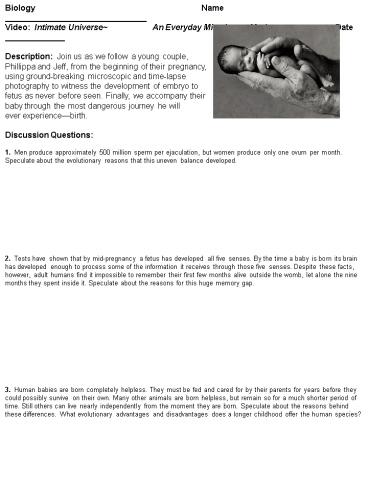BiologyName _______________________________ PowerPoint PPT Presentation
1 / 2
Title: BiologyName _______________________________
1
Biology Name _______________________________ Vi
deo Intimate Universe An Everyday
Miracle Mods. ____________ Date
_____________ Description Join us as we follow
a young couple, Phillippa and Jeff, from the
beginning of their pregnancy, using
ground-breaking microscopic and time-lapse
photography to witness the development of embryo
to fetus as never before seen. Finally, we
accompany their baby through the most dangerous
journey he will ever experiencebirth.
Discussion Questions 1. Men produce
approximately 500 million sperm per ejaculation,
but women produce only one ovum per month.
Speculate about the evolutionary reasons that
this uneven balance developed. 2.
Tests have shown that by mid-pregnancy a fetus
has developed all five senses. By the time a baby
is born its brain has developed enough to process
some of the information it receives through those
five senses. Despite these facts, however, adult
humans find it impossible to remember their first
few months alive outside the womb, let alone the
nine months they spent inside it. Speculate about
the reasons for this huge memory
gap. 3. Human babies are born
completely helpless. They must be fed and cared
for by their parents for years before they could
possibly survive on their own. Many other animals
are born helpless, but remain so for a much
shorter period of time. Still others can live
nearly independently from the moment they are
born. Speculate about the reasons behind these
differences. What evolutionary advantages and
disadvantages does a longer childhood offer the
human species? (Over, please)
2
4. Almost all babies are born with an ability to
perform two simple tasks that most of us take for
granted they can grab onto things, and they know
not to breathe when theyre underwater. These
abilities are known, respectively, as the
grasping reflex and the diving reflex.
Hypothesize about their origin. Are they remnants
of traits that have been passed down from our
evolutionary ancestors? 5. What
can you remember about the things you learned
during your first three years? At some point
after you were born, you learned to walk, talk,
read, feed yourself, tie your shoes, write, and
even clap your hands together, among countless
other simple and complex tasks. Do you think you
could learn as many new things now during a
three-year period as you did back then? Are
babies brains more adaptable to new knowledge
and information? Explain your thinking.
6. Many parents enroll their children in
day care in order to be able to return to work or
to help their children learn to socialize with
other children. Some parents, on the other hand,
believe that their children need to spend their
early years at home with a mother or father.
Debate the pros and cons of day care for a baby
or small child. What could be done, either by
legislation or by individual companies, to find a
middle ground between these two options?

